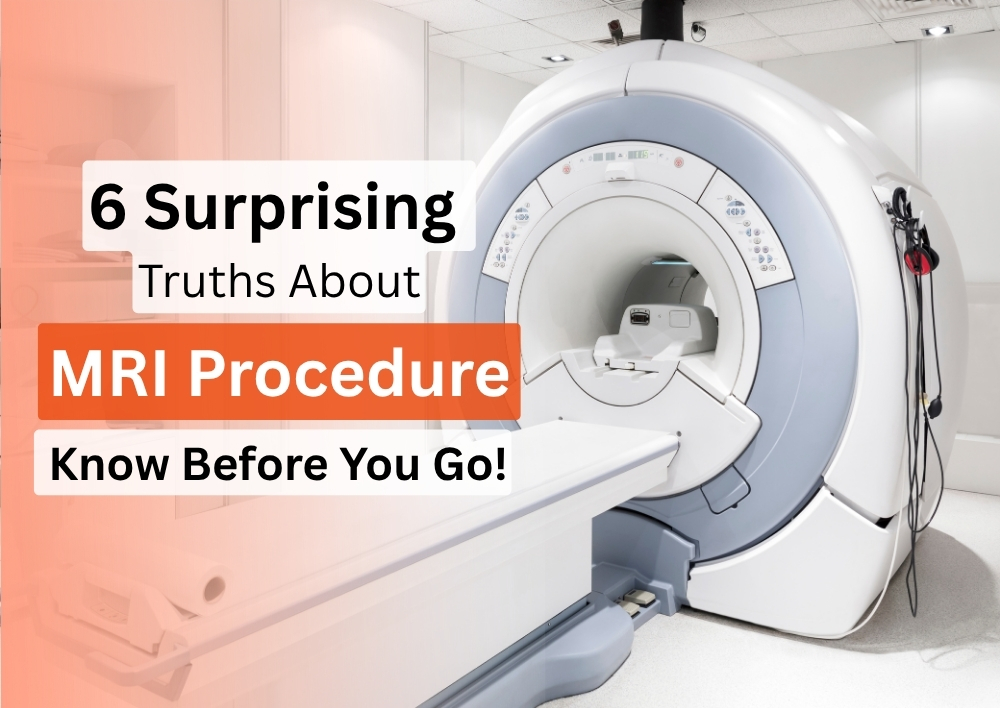6 Surprising Truths About MRI Procedure: Know Before You Go!
Summary: It is normal to feel a little nervous before your first MRI procedure. From the effects of metal implants to the reality of loud noises and confined spaces, understanding what to expect can ease anxiety and improve your experience. The six important truths help patients stay safe, informed, and comfortable during the MRI procedure.
Overview:
MRI (Magnetic Resonance Imaging) is one of modern medicine’s most advanced and non-invasive diagnostic tools. It allows doctors to view detailed images of your brain, spine, joints, abdomen, and even blood vessels without any cuts or pain.
Despite how commonly it is used, many people feel nervous or unsure before their first MRI scan. It is true that several questions may come to mind before the procedure, which is why Dr. Madhurima Sood, a leading radiologist in Gurgaon at Miracles Mediclinic.
Six surprising facts you must know before undergoing an MRI scan
1. Metals in Your Body Can Be Hazardous
One of the most important rules in MRI is simple: no metal allowed!
An MRI machine has strong magnets that help take clear pictures of your body from the inside. But if you have any metal in your body, such as
-
A pacemaker
-
Artificial joints
-
Dental implants
-
Cochlear implants
-
Surgical clips
-
Metal fragments from an old injury
These can create a serious risk during the scan. Metal can move or heat up under the magnetic force, which could cause harm or affect the quality of the images.
Tips: Always inform your MRI technician if you have any metal in your body, even if it is something small like a piercing or dental work.
2. Pregnancy and MRI: A Big NO (At Least in Early Stages)
If you are pregnant, MRI scans are usually avoided in the first trimester, unless necessary. This is an important time for the baby’s growth and development.
MRI does not use harmful radiation like X-rays or CT scans, but doctors still try to avoid any possible risks during early pregnancy.
However, if it’s needed for your health or your baby’s health later in pregnancy, your doctor may recommend it with proper guidance.
“While MRI is considered safer than many other scans, we always evaluate risks versus benefits during pregnancy,” says Dr. Madhurima.
3. Contrast Dye is Not for Everyone
Sometimes, your doctor may ask for a contrast MRI. This means a special dye (usually gadolinium-based) is injected into your vein to highlight certain areas more clearly, especially for brain, spine, or blood vessel scans.
But here's the surprising part, not everyone can tolerate contrast dye.
If you have kidney problems, the dye may not be safe.
Some people are allergic to the dye.
Pregnant or breastfeeding women should inform the doctor beforehand.
Before any contrast MRI, you will be asked about your medical history and kidney function to make sure it’s safe for you.
4. Claustrophobia is a Real Concern
Many people don’t realize this until they are actually inside the machine. MRI machines are narrow and enclosed, especially the traditional "closed" MRI types. If you are claustrophobic or have anxiety, the experience can feel overwhelming. You may feel trapped or nervous, especially during longer scans.
There are ways to manage it and make the experience more comfortable:
Practice relaxation techniques before the scan, such as deep breathing or visualization.
You can wear earplugs or listen to soft music during the scan to help you stay relaxed.
In some cases, your doctor may prescribe a mild sedative to help you stay relaxed.
Additionally, many centers now offer newer MRI machines with open sides or wider bores, specifically designed to reduce feelings of anxiety.
5. The Machine Can Get Loud, Really Loud!
MRI machines are known for their loud knocking or buzzing sounds during the scan. It is completely normal and part of the imaging process.
Why is it so noisy? These sounds are caused by the magnets rapidly switching on and off to create clear images of your body.
MRI technicians offer noise-canceling headphones or earplugs to make the experience more comfortable.
So, don’t be alarmed. Just know it is part of the process.
6. Staying Still is Super Important
During an MRI scan, the machine takes multiple images, like slices of your body from different angles. If you move even a little, the images can become blurry, and the scan might have to be repeated.
Some scans take just 15 to 30 minutes, while others can go up to 45 to 60 minutes depending on the body part. It may feel long, but staying still is key to getting the best results.
Pro Tip: If you are worried about moving or feeling uncomfortable, ask the technician how long your scan will take and let them know if you need a break.
Conclusion:
An MRI scan might seem a little scary at first, but with the right information and preparation, it is completely safe and painless. It is a powerful tool that helps doctors detect health problems like brain tumors or spine issues early and accurately. If your doctor has advised you to get an MRI, don’t wait, book your MRI scan near you at Miracles Healthcare for accurate scans, advanced machines, and expert radiologists who ensure your comfort every step of the way. Book your appointment today!
Frequently Asked Questions
An MRI scan is used to take detailed images of organs, bones, joints, and soft tissues to help diagnose various health conditions.
The main purpose is to detect abnormalities inside the body without using harmful radiation.
It shows if there is anything wrong in the brain, spine, joints, stomach area, or blood vessels.
An MRI scan usually takes between 15 to 45 minutes, depending on the body part being scanned.
Avoid wearing metal objects, and inform your doctor if you have any implants or medical devices.
Stay very still during the scan, follow the technician’s instructions, and use earplugs for comfort.
Metal items like jewelry, watches, credit cards, and phones are not allowed inside the MRI room.
Miracles Mediclinic is one of the best MRI centres in Gurgaon, known for its advanced machines and expert radiologists.







.webp)







Was the information useful?
0 0